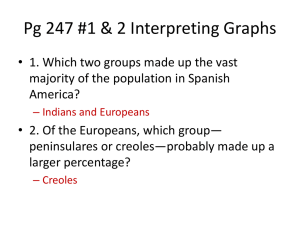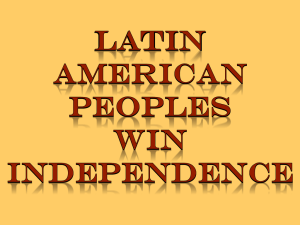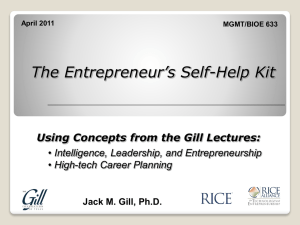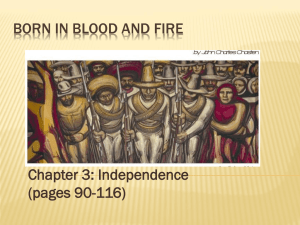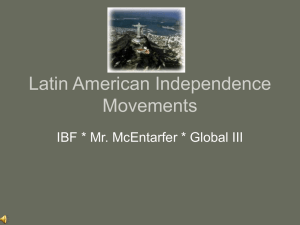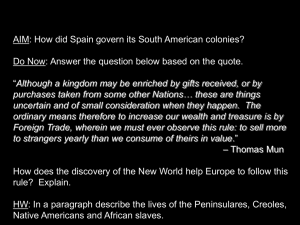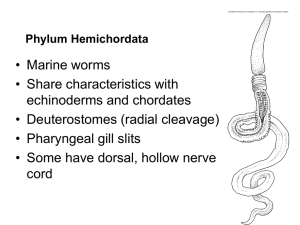a presentation of research findings geetanjali gill, phd
advertisement
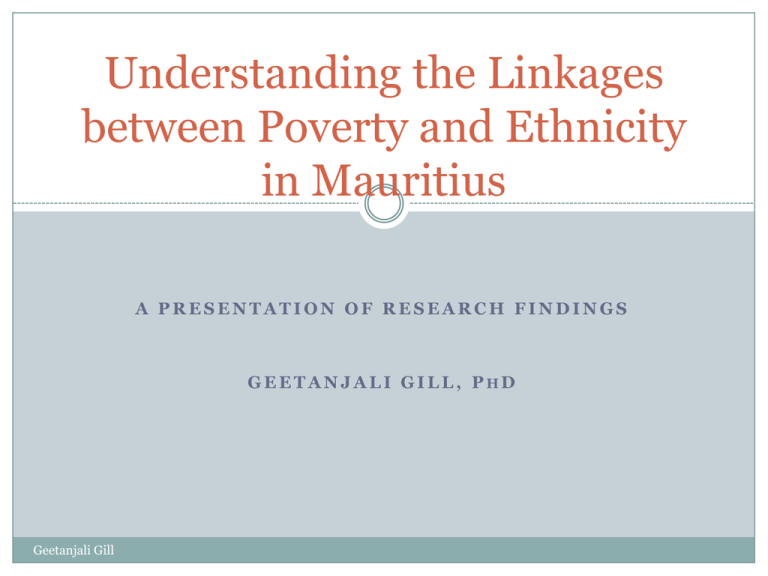
Understanding the Linkages between Poverty and Ethnicity in Mauritius A PRESENTATION OF RESEARCH FINDINGS GEETANJALI GILL, PHD Geetanjali Gill Outline of Presentation Rationale and Focus Methodology Empirical Findings: Education and Employment Government Services and Resources Formal and Informal Social Networks ● Conclusions and Implications Geetanjali Gill Rationale The difficulty of defining poverty in the ‘Mauritian context’ Ethnicity treated as ‘taboo’ Overabundance of ‘culture of poverty’ arguments Geetanjali Gill Methodology 2 months preliminary baseline survey 14 key informants and 41 households 13 months of primary and secondary data collection 130 households, 4 focus group discussions, 19 local and national key informants In-depth, unstructured, and largely qualitative interviews ‘Snowball sampling’ Participant observation Geetanjali Gill Research Sample: Poverty and Ethnicity Local ethnic categorisation and articulation Local indicators of poverty Poverty as material deprivation Socio-economic categories UltraPoor Poor Ordinary MiddleTotal No. class/elite Indian +Tamil +Telegu 22 36% 13 21% 15 25% 11 18% 61 Muslim 2 10% 3 16% 37% 7 37% 19 Creole 13 30% 17 40% 12 Geetanjali Gill 7 28% 1 2% 43 Research Sample: Ultra-poor Creoles Geetanjali Gill Creole Group Ultra-Poor Category Darker-skinned 78% Medium-skinned 22% Lighter-skinned 0 Research Sample: Income and Ethnicity Geetanjali Gill Ethnic Category Average Monthly Household Income USD $ Indian +Tamil +Telegu 383 Muslim 566 Darker-skinned Creole 153 Medium-skinned Creole 238 Lighter-skinned Creole 277 Demographic Characteristics of the Poor 83% of female heads 73% of female widows 78% of separated household heads 73% of extended households 67% of 1 or 2 person elderly-only households 67% of households with young children Geetanjali Gill Empirical Findings: Education and Employment THE NEED FOR PERMANENT AND SECURE EMPLOYMENT TO ESCAPE FROM POVERTY THE POTENTIAL ROLE OF EDUCATION TO LEAD TO SOCIAL AND ECONOMIC MOBILITY Geetanjali Gill I: An Ethnically-Segmented Labour Force Indians, Tamils, Telegus, and Muslims had white- collar public-sector work Indians and Creoles had white-collar private sector work Indians, Tamils, Telegus, Creoles worked as casual labourers and masons, low-level factory workers, and informal sector workers. Indians, Tamils, Telegus, and Muslims involved in more remunerative forms of self-employed compared to Creoles Geetanjali Gill II: Ethnic Discrimination in Recruitment Negative stereotyping of Creoles, and to a lesser degree of Muslims by employers: “…generally people don’t like to hire Creoles because they have a bad way of behaving. The first choice would be Indians, then Muslims, then Creoles for hiring”. [An Employer in Goodlands] Employer discrimination limits Creoles’ employment opportunities and occupational mobility Geetanjali Gill III: ‘Creoles are discouraged and don’t dream’ An expectation of employer discrimination in recruitment impacts upon Creoles’ aspirations, resulting in a cycle of disadvantage and poverty “Overtime, if you are rejected from work and can’t find work, you become discouraged….Creoles are discouraged and don’t dream. And they don’t try. They see injustice and inequality and feel defeated. The Creole voice is very low and quiet”. [A Creole community leader] Geetanjali Gill IV. Ethnic Disparities in Education Creole household heads have lowest education levels; many darker-skinned Creoles with none at all Muslim household heads most educated Indian (and Tamil and Telegu) household heads split between those with little or no education, and those who have completed primary levels Geetanjali Gill V. A ‘Culture of Exclusion’ in Schools Mostly non-Creole teachers, many of whom have negative stereotypes of Creoles Creoles spoke of verbal abuse and discriminatory behaviour by teachers in classrooms Geetanjali Gill VI. Creoles lacking ‘Educational Aspirations’ Many Creoles did not feel that education would help them to gain better employment opportunities The experience and expectation of being discriminated against and mistreated in school (as in the labour market) negatively impacts upon Creoles’ educational aspirations Geetanjali Gill Empirical Findings: Government Services and Resources INHABITANTS IDENTIFIED THE ROLE OF THE STATE IN PROVIDING ACCESS TO KEY RESOURCES AND SERVICES AS CRITICAL TO THE EXPERIENCE OF POVERTY AND EXCLUSION Geetanjali Gill I. State ‘Gatekeepers’: Ethnic bias and discrimination In Goodlands, inhabitants’ encounters with the state mediated by non-Creole state ‘gatekeepers’ who display bias and prejudice Creoles disadvantaged in their access to certain state resources (e.g. permits, licences) Ultra-poor and poor Indians (Tamils, Telegus) and Muslims disadvantaged in their access to state welfare resources Geetanjali Gill II. Using One’s ‘Backing’ to Access the State Drawing upon social relations with state ‘gatekeepers’ to gain favourable access to the state, political processes, and state resources More social ties exist between non-Creole inhabitants and state ‘gatekeepers’ Ultra-poor and poor also generally disadvantaged Geetanjali Gill Empirical Findings: Formal and Informal Social Networks PEOPLE’S EXPERIENCES IN THEIR SOCIAL ENVIRONMENTS CAN INFLUENCE THEIR EXPERIENCES WITH POVERTY Geetanjali Gill I. The Influence of Housing and Neighbourhoods Property Status of Residents Total No. (%) Inherited 80 (61%) State Social Housing 31 (24%) Purchased land/house 14 (11%) Renting 5 (4%) 51% of Creoles living in social housing 79% of Indians/Tamils/Telegus living on inherited family land 58% of Muslims living on inherited family land 32% of Muslims purchased their own land or house Geetanjali Gill II. Formal Organisations A predominance of ethnic-specific groups, socio- cultural and religious groups: 76% Hindu, 18% Muslim, 6% Catholic/Christian Very few formal organisations functioned in a social welfare role Some ultra-poor and poor member of Hindu associations faced ostracism and social exclusion Geetanjali Gill III. Informal Social Networks Muslims (including ultra-poor) most able to receive assistance (financial and non-financial) from kin (75%) and non-kin (67%) 67% of Creoles got support from kin, and 33% from non-kin, but mostly non-financial 50% of Indians got support from kin (financial and non-financial) but very few of the ultra-poor; 50% of Indians got support from non-kin (mostly nonfinancial) Ultra-poor Indians least able to access informal social networks for socialisation Geetanjali Gill IV. Social Isolation and Poverty 2/3 of ultra-poor Indians, most of whom were female-heads and widows, affected Excluded due to non-conformance to group’s norms, values and beliefs Stigmatisation of female-heads and widows amongst Hindus Geetanjali Gill Conclusions Creoles affected by ‘mutually-reinforcing processes’ of ethnic discrimination and self-exclusion in realms of education, employment, and relations with the state Ultra-poor and poor Indians, Tamils, Telegus and Muslims overlooked by state representatives and hesitant to make welfare claims on the state Ultra-poor Indians (mostly widowed female-heads) faced intra-group social exclusion and social isolation Geetanjali Gill Broader Implications for Discussion Ethnic stereotypes, prejudice, discrimination and exclusion critical factors; and psycho-social impacts The important role of meso-level state actors and processes, and ethnic bias Examination of the role of NGOs and CBOs in ongoing poverty programmes Universalism or targeting? Best practices and exchange of information with other ethnically-plural countries tackling poverty Geetanjali Gill
